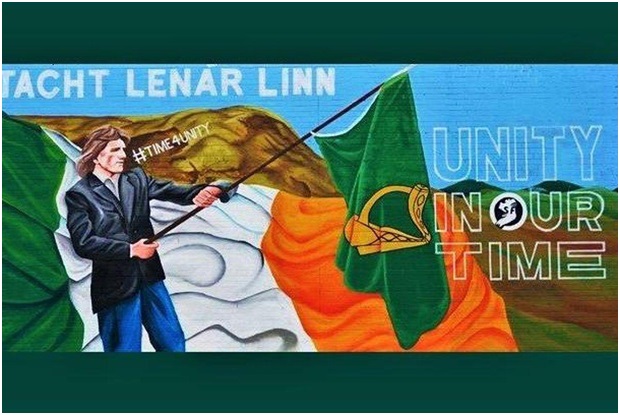
Has the time come, at last, for a united Ireland? The day after the vote that changes everything, hundreds of rain-soaked people, in silence, their faces bowed to the ground, but this time full of the sunshine of joy, greet the grave of Bobby Sands[1] , who died in prison after 66 days of hunger strike, unjustly sentenced to 14 years without ever having fired a shot[2]. Memory also calls for justice for the 14 civilians barbarously murdered by British paratroopers in Derry[3] on Sunday, 30 January 1972[4] – the aberrant act of bloodshed recalled by U2 in ‘Sunday Bloody Sunday’[5]. In Ulster, a century after its violent birth, the historic election victory of the Sinn Féin party[6] achieves a miracle.
Celebrating are not only republican Catholics, but also thousands of pro-English Protestants who, fed up with the suicidal decisions of the London government, voted Sinn Féin because they want to return home: to Ireland, part of the United Europe. The left-wing nationalist party[7] becomes for the first time the leading party in Stormont House[8], the seat of the Northern Ireland Assembly[9]. It is a result predicted by the polls, but an exceptional one nonetheless: yet it may contribute to making the plan even more tilted towards a reunification of Ireland[10], because, once again, political and military power is going in the opposite direction to that of the people. But that very people, torn apart by a century of bloodshed and religious divisions, has finally chosen the only possible peace: one in which all Irish people are sisters and brothers, and no longer enemies.
The campaign
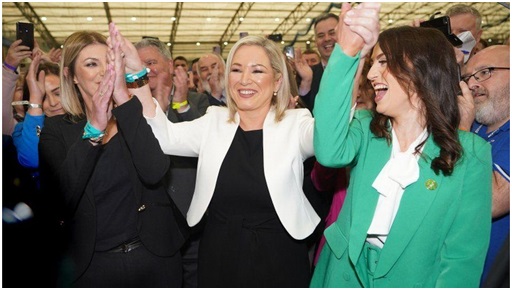
Michelle O’Neill (centre), possibly the first Sinn Féin leader to become Northern Ireland’s prime minister[11]
As, in the Magherafelt conference centre[12], the entire Sinn Féin leadership, led by the two leaders Michelle O’Neill[13] and Mary Lou McDonald[14], arrives, an ovation greets them. Gerry Adams, for reasons of expediency, because of his CV, is not there[15]. When he sees them, the Unionist leader and great loser, Sir Jeffrey Donaldson[16] , turns and walks away. Northern Ireland’s past and future do not even look each other in the face[17]. Michelle O’Neill is 45 years old, born into a prominent Republican family. Her father Brendan was a prisoner of the IRA[18], the armed wing of the Republicans, then elected in Dungannon[19] where she took over the seat in 2005. Having become a mother at a very young age, she has always had her family by her side. The leap forward came in 2007 when three historic leaders (Francie Molloy[20] , Martin McGuinness[21] and Gerry Adams[22] ) promoted her candidature for the party leadership[23].
The turnout was 63.6%, slightly lower than in the 2017 election[24]. The Catholic republicans of Sinn Féin, a party marginalised for years by the other political forces in Ireland, obtained a relative majority. For the first time they overtook the largest of the Protestant Unionist parties, the DUP[25] , both in percentage of votes (29% versus 21.3%) and in number of seats, 27 versus 24[26]. Michelle O’Neill now has the numbers to become Ulster’s first nationalist premier: a milestone for the political wing of the IRA[27] (Irish Republican Army), the military group that has almost a century of brutal violence behind it in trying to take Ulster out of the United Kingdom[28].
Scottish First Minister Nicola Sturgeon[29], also campaigning for secession from the UK, was among the first to congratulate Sinn Féin, hailing a ‘truly historic achievement[30]‘. In the United Kingdom, the press commented on the result as the first outcome of the Partygate scandal, with Prime Minister Boris Johnson at the centre of the investigation[31] into parties held in the government building[32] in violation of pandemic laws[33]. The ‘proof’: Sinn Féin is not the only winner of the election, the centrist Alliance Party[34], neither nationalist nor unionist, also achieved a historic result[35], winning 17 seats, becoming the third largest party in the assembly[36].
Electoral success may not be enough for Sinn Féin to go into government. The left-wing nationalists are still seen by many as a danger to democracy, and the two conservative parties, which have ruled since 1921[37], may decide to ally themselves to exclude Sinn Féin[38]. With defeat in the election, the DUP may blow up the Belfast Agreement (the Good Friday Agreement[39]) which ended decades of Catholic-Protestant conflict and stipulates that Northern Ireland’s institutions are to function on the principle of consociativism (power-sharing)[40] and that the posts of prime minister and deputy prime minister are to be divided between the largest Unionist party and the largest Nationalist party[41] in equal roles[42]. According to the Accord, if one of the two resigns, the office of the other also automatically ends[43].
In the new century, however, things have changed: since 2007 there has been a DUP prime minister and a Sinn Féin deputy prime minister[44]. Therefore, in order for Sinn Féin to hold the post of prime minister, the DUP must agree to take over the post of deputy prime minister[45]. But the DUP has announced that it will not put forward a candidate to stand alongside a Sinn Féin prime minister[46], even though O’Neill campaigned and made post-vote statements that were entirely conciliatory[47]. The real reason for the dispute is not cosmetic: Sinn Féin is pro-European, the DUP has been a fierce opponent of European integration since the 1970s[48]. Leader Jeffrey Donaldson said: ‘We take note of the result. We will discuss the next steps to achieve the goals we need, namely a stable Northern Ireland, a sound economy and our well-functioning political institutions’[49].
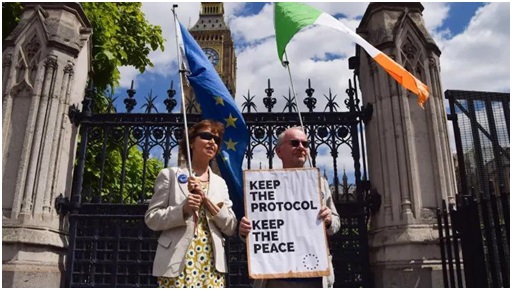
Protesters outside Parliament with EU and Irish flags defend the Ulster Protocol[50]
Donaldson added, however, that he refuses to participate in a government and will boycott Sinn Féin until Boris Johnson tears up[51] the Northern Ireland Protocol[52] , part of the Brexit withdrawal agreement, which places a trade border between Northern Ireland and Great Britain (England, Scotland and Wales)[53] , which is opposed by many Unionists[54] who have weakened their support for the party by not feeling represented[55]. The border agreements will, in fact, be a thorn in the side of the new government in Belfast[56], Unionists see it as an affront to their British identity[57].
Before Brexit, which the DUP strongly wanted, the United Kingdom and the Republic of Ireland were both part of the Union, and the border was dismantled: the republicans finally felt part of a reunited island, while the unionists still felt firmly tied to London. Brexit ruined everything because now, with the UK out of the EU, a border must be put back in place to protect the quality and standards of the European single market[58]. That is why, on 4 February this year, Paul Givan[59] (DUP) resigned in protest as Northern Ireland’s prime minister (he had been in office since June 2021)[60].
The reasons for the victory

Gerry Adams carries the coffin of Thomas Begley, IRA militant, perpetrator of the Shankill Road bombing, 27 October 1993[61]
Sinn Féin, from the Gaelic ‘We Ourselves’[62], does not have the numbers to govern alone and finds it very difficult to find allies. Nevertheless, the victory remains a very important moment in Irish history, especially for the attempts to detach itself from the most violent part of its past[63]. The turning point in its troubled history came with the resignation of Gerry Adams in 2018 and the election as party leader of Mary Lou McDonald, a politician with a very different history from her predecessor. Raised in a middle-class Dublin family, she was an activist in the conservative Fianna Fail party and, like Michelle O’Neill, joined Sinn Féin after the Good Friday Agreement[64]: she has nothing to do with the party’s turbulent past and, unlike Adams, does not have to defend herself against charges of having been part of the IRA.
The election of McDonald, a leader respected also by her opponents, allows Sinn Féin to increase its consensus, especially among young people and thanks to increasingly progressive proposals[65]: during the election campaign, Sinn Féin has focused on appeasement[66], no longer talking about the reunification of Ireland, but concentrating on the economic problems of the country, mainly caused by Brexit: the skyrocketing cost of living[67], the housing shortage[68] and waiting lists for health care[69], the main concerns of the population[70], especially due to the failure of the outgoing government[71]. Among the younger generation, Sinn Fèin talks about other central issues, such as the legalisation of abortion and same-sex marriages and, as the New York Times writes[72], opposing the austerity policies adopted by conservative governments after the 2008 economic crisis[73].
Sinn Féin addresses issues that touch people, regardless of Catholic, nationalist or republican background. Although polls indicate that the appetite for Irish unity is less than 50 per cent (both in Ulster and Eire)[74] there is hope in the future for a referendum on unity[75]. Michelle O’Neill denies that with Sinn Fèin in government there will be any momentum[76], as a referendum for secession is at the discretion of the British government and not conceivable in the next few years – especially with the strong Scottish secessionist movements[77]. He says things could change if, in 2025, Sinn Fèin wins in Dublin as well[78].
The history of Sinn Fèin
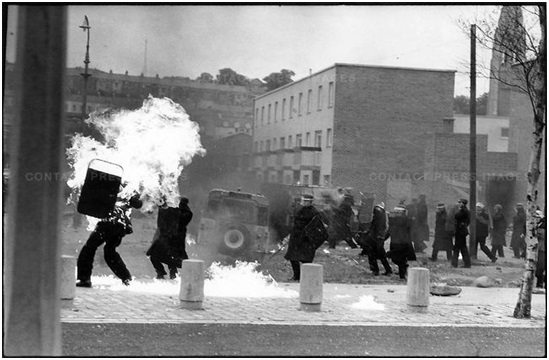
August 1969: clashes between Irish Catholics and the police at the Battle of Bogside[79]
Sinn Féin was founded in 1905 on the initiative of Irish journalist Arthur Griffith[80]. Its goal was the achievement of self-determination and full Irish national sovereignty and secession from the United Kingdom[81]. Sinn Féin is thus among the protagonists in the Easter War of Independence of 1916[82]. The volunteers fighting for Irish independence organised themselves into an army answering to their own military command, the IRA (Irish Republican Army), commanded by Michael Collins[83] , who is also a member of the Dáil Éireann, the Lower House of the Irish Parliament[84].
Collins is highly respected by the volunteers of the Republican Army because he personally participates in military actions. He does not obey the directives of the Dáil that ask the IRA to adapt to the strategy of the other nationalist organisations; on the contrary, he organises the army according to criteria linked to guerrilla terrorism. This strategy brought him a series of successes against the British army in the following years, leading to the Anglo-Irish Treaty of 1921[85], when the partition of the island was sanctioned and Northern Ireland was created[86]. Following the War of Independence, the nine counties of Ulster, later to become six, remained under British control. The remaining 26 formed the Republic of Ireland, now known as Eire[87]. The splits of those years gave rise to the two parties that dominated Irish politics for almost a century, Fine Gael[88] and Fianna Fáil[89], both conservative, while Sinn Féin remained a minority opposition political force[90].
The struggle of the IRA, with the support of Sinn Féin, continued until the late 1990s, especially during the civil war of the Troubles[91] : the clashes between the Unionists, for the most part Protestant and in favour of Northern Ireland remaining in the United Kingdom, and the Republicans, Catholic and in favour of the unification of the whole island[92]. The Troubles caused 3500 deaths[93] and lasted three decades, ending in 1998 with the Good Friday Agreement[94]. The root of the war is the medieval past, when British Protestants subjugated Ireland’s native Catholic population[95].
On 28 July 2005 the IRA ordered the militants to surrender their weapons, the Troubles became an uncomfortable legacy of the past[96]. During the campaign for this election, Sinn Féin was adept at distancing itself from the more controversial aspects of its history: ‘There is an urgency to restore an Executive and start putting money back into people’s pockets, to start fixing the health service. People can’t wait,’ is the most important part of the political programme[97]. The party has changed a lot, first of all from a generational point of view.
The fact remains that Sinn Féin’s victory, combined with the gradual strengthening of the Scottish Nationalist Party, is helping to show the London monarchy more naked than ever[98]. The people of Northern Ireland are in desperate need of Brussels: it seems absurd in 21st century Western Europe, but in the protocol, the EU pledges to send food and medicine to Ulster, and in the past few hours, after the complaint against the UK was lodged, the director of the EU diplomatic office in Belfast, Colette Fitzgerald, has been the subject of desperate messages from those in Ulster who fear that this material aid may now be suspended[99].
Boris Johnson’s attitude
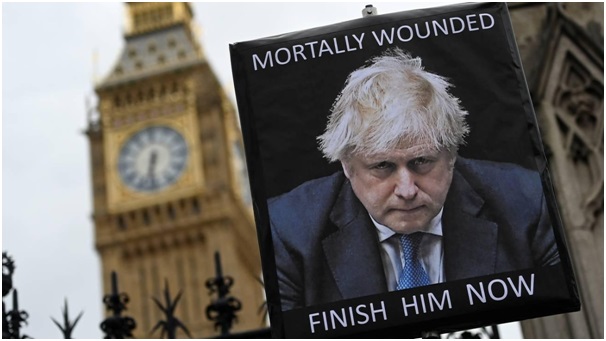
People’s adherence to Boris Johnson’s image continues to decline[100]
Of all the territories in the United Kingdom, the one that suffered the most from Brexit was Northern Ireland. A land still strongly divided between Catholics (descendants of the island’s original Irish population) and Protestants (descendants, instead, of British settlers). With Brexit, the conflict is rekindled – as evidenced by the Easter 2022 violence in Belfast and the iconic city of Londonderry[101] (called simply Derry by Catholics, who do not want to hear the word ‘London’ juxtaposed with its name)[102].
At the beginning of the Troubles, in the late 1960s, Catholic leaders denied that the tensions had a religious motive. On the other side of the fence, however, thunders Ian Paisley, a fundamentalist Protestant[103], leader of the Free Presbyterian Church[104] and co-founder of the strongly anti-Catholic newspaper The Protestant Telegraph[105]. He founded the Democratic Unionist Party and in a controversial agreement, together with Theresa May[106], helped keep her Conservative Party in power for years. Following Paisley’s blatant religious activism and inflammatory messages, the leaders of the four main churches (Presbyterians, Church of Ireland, Methodists and Catholics) began to be more active, playing a positive negotiating role which, after the signing of the Good Friday Agreement, became an openly political role[107].
The interreligious conflict is similar to the one between Israel and Palestine, because the object of contention is territory that belonged to the two opposing factions at different times. Large numbers of Protestants have settled in Northern Ireland, a traditionally Catholic territory, and own most of the land, leaving the Catholics in poverty, which obviously causes resentment[108]. Organisationally, there is a clear separation of church and party in Northern Ireland. The exception is the DUP: its close links with the Free Presbyterian Church have made it a unique case in the British and Irish context. The historical relationship between the main Unionist parties and the Orange Order[109], a quasi-religious order, further blurs the boundaries between religion and politics in Ulster. The DUP’s staunch conservatism, derived from its commitment to a fundamentalist Protestant doctrine, leads it to clash with more open parties[110] such as Sinn Féin, especially on issues such as abortion rights and homosexuality.
In 2016, the majority of Northern Ireland voters voted in the Brexit referendum in favour of remaining in the European Union – as did Scotland[111]. A large number of voters in Wales and England preferred the exit, which then prevailed with a majority of 51.89%[112]. In October 2019, following the exit from the EU, the Northern Ireland Protocol was adopted, which triggered a series of heated party clashes. Some loyalist paramilitary groups withdrew their support for the Good Friday Agreement, and between February and April 2021 graffiti first appeared against the customs border, and then clashes were recorded in Unionist areas[113].
The government of Prime Minister Boris Johnson has published a draft bill[114] to rewrite the protocol[115] and unilaterally leave the agreement, abolishing customs controls[116]. Johnson wants to simplify the flow of goods from Britain to Northern Ireland and remove additional costs and paperwork for businesses, insisting that the proposed changes are trivial, but he is creating a battle on several fronts, including among the Conservatives. The EU is also strongly opposed to the move, saying it violates international law[117] and on 15 June the European Commission took legal action against the UK for failing to comply with the protocol and gave it two months to react: there could be legal action leading to fines and penalties and some experts fear a possible trade war[118].
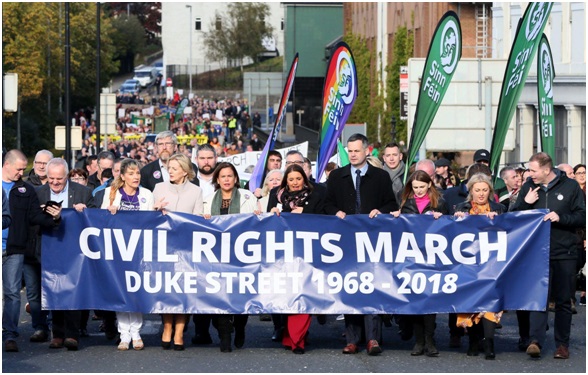
8 October 2018: Fifty years after the first great march in Derry, the people of Sinn Fèin march armed only with their flags and in the name of civil rights – the new generation of the Irish left has discovered the peace and community of destiny of all Northern Irish people[119]
The UK government has tried to justify the move by claiming that the protocol causes ‘a danger’ to stability in Northern Ireland, affecting social and political conditions and threatening the Good Friday Agreement: the Unionist community says it does not benefit from being part of the UK. Of an opposing view is Sinn Féin vice-president Michelle O’Neill, who describes Johnson’s bill as ‘illegal’ and a ‘clear violation’ of international law: ‘What Boris Johnson is doing is increasing political instability and creating even more economic uncertainty for days and weeks to come’[120].
According to the Times, Joe Biden[121] , of Irish descent and opposed to Brexit, has reportedly asked his diplomats to ‘chastise’ Boris Johnson for endangering the Northern Ireland peace process with the tensions he has created and expressed the growing concern of the US administration[122]. The Conservatives do not forgive him the shadows of his government: Partygate and the handling of the Northern Ireland Protocol have created a sense of mistrust among Conservative MPs[123].
What Sinn Fèin’s victory teaches us
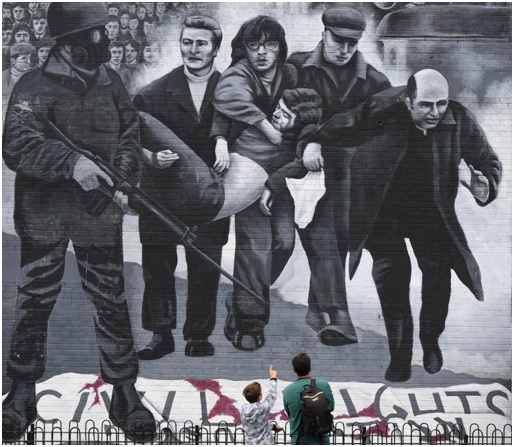
The mural on the Museum of Free Derry, one of the most famous images of the 1972 Easter Massacre[124]
A former Northern Ireland Labour Secretary, Peter Hain[125], has said that Boris Johnson is engaging in ‘Putinesque’ tactics, using the Northern Ireland Protocol Bill to provoke a populist row with Brussels just when the EU is willing to compromise. Behind this cloud of words lies the fact that even the Conservatives have now realised that Brexit has had a disastrous effect on the British economy and society. Boris Johnson clings to power despite the mutiny of his own MPs. To attract support he triggers a row with Brussels, because this tactic worked so well in the 2016 Brexit referendum, and hopes the effect will be repeated at the next general election[126].
Persuading the DUP to join a new government and trying to pressure the EU into agreeing to major changes in the post-Brexit arrangements is a headache for Boris Johnson[127], already over 100 days involved with the war in Ukraine[128]. Unfortunately the loser in all this is Northern Ireland. The majority of voters in the May elections supported the parties that defended protocol[129], but it did not help: the wishes of the majority of the population are being ignored, the nation remains at the mercy of an autocratic and dangerously divisive populist – who refuses to learn from his own mistakes.
In the despair of this people, and in their constructive desire to find new alliances, we glimpse a glimpse of the Europe in which we believe: a community of peoples that forgets the wars of the past, safeguards religious, cultural and political differences, but binds everyone to a single possible future destiny, which is that of the restoration of the original values of democracy, civil rights and peace. An affirmation that today, it must unfortunately be admitted, is revolutionary.
[1] https://conoscerelastoria.it/bobby-sands-ecco-chi-era-lattivista-irlandese-che-si-lascio-morire-di-fame/
[2] https://www.scomunicando.it/notizie/memo-37-anni-fa-la-morte-di-bobby-sands/
[3] https://www.chicksandtrips.net/derry-bloody-sunday-bogside/
[4] https://www.barbadillo.it/96182-perche-ricordare-i-14-patrioti-del-bloody-sunday-a-49-anni-dalla-strage/
[5] https://medium.com/@thelegendsofmusic/sunday-bloody-sunday-the-story-behind-u2s-most-political-song-f3fd719e1009
[6] https://www.belfasttelegraph.co.uk/news/politics/northern-ireland-assembly-election-2022/
[8] https://discovernorthernireland.com/things-to-do/parliament-buildings-stormont-p676201
[9] https://it.euronews.com/2022/05/07/irlanda-del-nord-vittoria-elettorale-storica-per-il-sinn-Féin
[10] https://www.ilpost.it/2022/05/07/irlanda-del-nord-elezioni-sinn-Féin/
[11] https://www.bbc.com/news/uk-northern-ireland-60786728
[12] https://www.voanews.com/a/sinn-Féin-set-for-historic-win-in-northern-ireland-election/6561833.html
[13] https://www.sinnFéin.ie/michelle-oneill
[14] https://www.sinnFéin.ie/mary-lou-mcdonald
[15] https://www.britannica.com/biography/Gerry-Adams
[16] https://www.culturaldiplomacy.org/academy/index.php?jeffrey-donaldson
[17] https://www.repubblica.it/esteri/2022/05/07/news/irlanda_del_nord_sinn_Féin_primo_partito-348552461/
[18] https://www.britannica.com/topic/Irish-Republican-Army
[19] https://www.theguardian.com/politics/2022/may/07/michelle-oneill-centre-stage-for-sinn-Féin-prospective-first-minister
[20] https://www.belfasttelegraph.co.uk/news/informer-molloy-is-linked-to-ira-killing-28069163.html
[21] https://www.theguardian.com/politics/2017/mar/21/martin-mcguinness-timeline
[22] https://www.britannica.com/biography/Gerry-Adams
[23] https://www.firstonline.info/elezioni-irlanda-del-nord-sinn-Féin-vince-e-festeggia-una-svolta-storica-michelle-oneill-brinda-al-trionfo/
[24] https://www.ilpost.it/2022/05/07/irlanda-del-nord-elezioni-sinn-Féin/
[26] https://www.primapress.it/societa2/mondo/165-attualita/mondo/irlanda-del-nord-la-svolta-a-sinistra-in-ulster-con-sinn-Féin-che-vince-le-elezioni.html
[27] https://www.britannica.com/topic/Ulster-Unionist-Party
[28] https://www.npr.org/2022/05/07/1097417453/sinn-Féin-wins-assembly-election-northern-ireland?t=1655018551829
[29] https://www.snp.org/your-team/nicola-sturgeon/
[30] https://www.reuters.com/world/uk/sinn-Féin-calls-united-ireland-debate-after-historic-election-win-2022-05-07/
[31] https://www.gov.uk/government/people/boris-johnson
[32] https://www.bbc.com/news/uk-politics-61560535
[33] https://www.nytimes.com/live/2022/05/06/world/uk-elections-northern-ireland
[34] https://www.allianceparty.org/?locale=en
[35] https://it.euronews.com/2022/05/07/irlanda-del-nord-vittoria-elettorale-storica-per-il-sinn-Féin
[36] https://www.bbc.com/news/uk-northern-ireland-60786728
[37] https://it.euronews.com/2022/05/07/irlanda-del-nord-vittoria-elettorale-storica-per-il-sinn-Féin
[38] https://www.ilpost.it/2020/02/11/storia-sinn-Féin-irlanda/
[39] https://www.britannica.com/topic/Good-Friday-Agreement
[40] https://www.liberopensiero.eu/19/05/2022/esteri/sinn-Féin-sogno-riunificazione-governare/
[41] https://www.npr.org/2022/05/07/1097417453/sinn-Féin-wins-assembly-election-northern-ireland?t=1655018551829
[42] https://www.bbc.com/news/uk-northern-ireland-60786728
[43] https://www.ilpost.it/2022/05/07/irlanda-del-nord-elezioni-sinn-Féin/
[44] https://www.theguardian.com/politics/2022/may/06/sinn-Féin-northern-ireland-stormont-assembly-election-results
[45] https://www.bbc.com/news/uk-northern-ireland-60786728
[46] https://it.euronews.com/2022/05/07/irlanda-del-nord-vittoria-elettorale-storica-per-il-sinn-Féin
[47] https://www.washingtonpost.com/world/2022/05/02/sinn-Féin-northern-ireland-elections/?itid=lk_inline_manual_5
[48] https://www.oxfordreference.com/view/10.1093/oi/authority.20110803095709758
[49] https://it.euronews.com/2022/05/07/irlanda-del-nord-vittoria-elettorale-storica-per-il-sinn-Féin
[50] https://www.cnbc.com/2022/06/14/uk-prompts-eu-backlash-over-plans-to-rip-up-northern-ireland-protocol.html
[51] https://www.repubblica.it/esteri/2022/05/07/news/irlanda_del_nord_sinn_Féin_primo_partito-348552461/
[52] https://www.adnkronos.com/brexit-londra-avvia-modifica-unilaterale-protocollo-irlanda-del-nord_4tsOOIT5rL3NJdER3Urbb1
[53] https://www.bbc.com/news/explainers-53724381
[54] https://ec.europa.eu/info/strategy/relations-non-eu-countries/relations-united-kingdom/eu-uk-withdrawal-agreement/protocol-ireland-and-northern-ireland_it
[55] https://www.reuters.com/world/uk/sinn-Féin-calls-united-ireland-debate-after-historic-election-win-2022-05-07/
[56] https://it.euronews.com/2022/05/07/irlanda-del-nord-vittoria-elettorale-storica-per-il-sinn-Féin
[57] https://www.lemonde.fr/en/international/article/2022/05/09/the-paradoxes-of-sinn-Féin-s-victory-in-northern-ireland_5982930_4.html
[58] https://www.repubblica.it/esteri/2022/05/06/news/riunificazione_irlanda_e_possibile_sinn_Féin_irlanda_del_nord_protestanti_cattolici_belfast-348255461/
[59] http://aims.niassembly.gov.uk/mlas/details.aspx?&aff=13236&per=268&sel=1&ind=0&prv=0
[60] https://it.euronews.com/2022/05/07/irlanda-del-nord-vittoria-elettorale-storica-per-il-sinn-Féin
[61] https://www.ilpost.it/2020/02/11/storia-sinn-Féin-irlanda/
[62] https://www.reuters.com/world/uk/sinn-Féin-calls-united-ireland-debate-after-historic-election-win-2022-05-07/
[63] https://www.ilpost.it/20 20/02/11/storia-sinn-Féin-irlanda/
[64] https://www.washingtonpost.com/world/2022/05/02/sinn-Féin-northern-ireland-elections/?itid=lk_inline_manual_5
[65] https://www.ilpost.it/2020/02/11/storia-sinn-Féin-irlanda/
[66] https://www.firstonline.info/elezioni-irlanda-del-nord-sinn-Féin-vince-e-festeggia-una-svolta-storica-michelle-oneill-brinda-al-trionfo/
[67] https://it.euronews.com/2022/05/07/irlanda-del-nord-vittoria-elettorale-storica-per-il-sinn-Féin
[68] https://www.ilpost.it/2022/05/07/irlanda-del-nord-elezioni-sinn-Féin/
[69] https://www.washingtonpost.com/world/2022/05/02/sinn-Féin-northern-ireland-elections/?itid=lk_inline_manual_5
[70] https://www.theguardian.com/politics/2022/may/06/sinn-Féin-northern-ireland-stormont-assembly-election-results
[71] https://www.finegael.ie/our-people/ministers/dublin/dublin-west/leo-varadkar/
[72] https://www.nytimes.com/by/benjamin-mueller
[73] https://www.ilpost.it/2020/02/11/storia-sinn-Féin-irlanda/
[74] https://www.washingtonpost.com/world/2022/05/02/sinn-Féin-northern-ireland-elections/?itid=lk_inline_manual_5
[75] https://www.theguardian.com/politics/2022/may/06/sinn-Féin-northern-ireland-stormont-assembly-election-results
[76] https://it.euronews.com/2022/05/07/irlanda-del-nord-vittoria-elettorale-storica-per-il-sinn-Féin
[77] https://it.euronews.com/2022/05/07/irlanda-del-nord-vittoria-elettorale-storica-per-il-sinn-Féin
[78] https://www.repubblica.it/esteri/2022/05/06/news/riunificazione_irlanda_e_possibile_sinn_Féin_irlanda_del_nord_protestanti_cattolici_belfast-348255461/
[79] https://irishstudies.sunygeneseoenglish.org/policing-in-northern-ireland-la-1992/battle-of-the-bogside-northern-ireland-august-1969/
[80] https://www.cso.ie/en/releasesandpublications/ep/p-1916/1916irl/cpr/coir/ag/
[81] https://www.ilpost.it/2022/05/07/irlanda-del-nord-elezioni-sinn-Féin/
[82] https://www.fattiperlastoria.it/rivolta-di-pasqua-1916-dublino/
[83] https://www.bbc.co.uk/history/historic_figures/collins_michael.shtml
[84] https://www.twinkl.it/teaching-wiki/dail-eireann
[85] https://cultura.biografieonline.it/ira-lotta-armata/
[86] https://www.ilpost.it/2022/05/07/irlanda-del-nord-elezioni-sinn-Féin/
[87] https://www.irlandaonline.com/conflitto-nordirlandese/
[88] https://www.britannica.com/topic/Fine-Gael
[89] https://www.fiannafail.ie/
[90] https://www.ilpost.it/2020/02/11/storia-sinn-Féin-irlanda/
[91] https://www.history.com/news/the-troubles-northern-ireland
[92] https://www.ilpost.it/2020/02/11/storia-sinn-Féin-irlanda/
[93] https://www.irlandaonline.com/conflitto-nordirlandese/
[94] https://indianexpress.com/article/explained/explained-sinn-Féin-northern-ireland-historic-change-politics-7903270/
[95] https://world101.cfr.org/how-world-works-and-sometimes-doesnt/conflict/understanding-northern-irelands-troubles
[96] https://cultura.biografieonline.it/ira-lotta-armata/
[97] https://www.liberopensiero.eu/19/05/2022/esteri/sinn-Féin-sogno-riunificazione-governare/
[98] https://www.ilpost.it/2022/05/07/irlanda-del-nord-elezioni-sinn-Féin/
[99] https://ec.europa.eu/info/strategy/relations-non-eu-countries/relations-united-kingdom/eu-uk-withdrawal-agreement/protocol-ireland-and-northern-ireland_en
[100] https://www.rsi.ch/news/mondo/Boris-Johnson-salva-la-poltrona-15389983.html
[101] https://www.belfastlive.co.uk/news/northern-ireland/derry-police-arrest-six-men-23720333
[102] https://it.insideover.com/politica/irlanda-del-nord-disordini-scontri.html
[103] https://it.alphahistory.com/Irlanda-del-Nord/ian-paisley/
[104] https://www.freepresbyterian.org/
[105] https://irishelectionliterature.com/2011/06/22/dup-newspaper-protestant-telegraph-from-september-1981/
[106] https://www.gov.uk/government/history/past-prime-ministers/theresa-may
[107] https://berkleycenter.georgetown.edu/responses/religious-leaders-and-the-northern-ireland-peace-process
[108] https://prezi.com/w_zvr1lhjjb4/the-religious-conflict-in-northern-ireland/
[109] https://www.britannica.com/topic/Orange-Order
[110] https://oxfordre.com/politics/view/10.1093/acrefore/9780190228637.001.0001/acrefore-9780190228637-e-652
[111] https://www.euronews.com/2020/01/30/brexit-timeline-2016-2020-key-events-in-the-uk-s-path-from-referendum-to-eu-exit
[112] https://it.insideover.com/schede/politica/irlanda-del-nord-conflitto.html
[113] https://it.insideover.com/schede/politica/irlanda-del-nord-conflitto.html
[114] https://www.lesenfantsterribles.org/this-is-england/articolo-16-johnson-e-gli-unionisti-vogliono-ridiscutere-gli-accordi-per-le-sei-contee/
[115] https://www.cnbc.com/2022/06/14/uk-prompts-eu-backlash-over-plans-to-rip-up-northern-ireland-protocol.html
[116] https://www.ispionline.it/it/pubblicazione/la-vittoria-di-sinn-Féin-irlanda-del-nord-cosa-significa-il-regno-unito-34950
[117] https://www.cnbc.com/2022/06/14/uk-prompts-eu-backlash-over-plans-to-rip-up-northern-ireland-protocol.html
[118] https://www.bbc.com/news/explainers-53724381
[119] https://www.bbc.com/news/uk-northern-ireland-45770938
[120] https://www.cnbc.com/2022/06/14/uk-prompts-eu-backlash-over-plans-to-rip-up-northern-ireland-protocol.html
[121] https://www.open.online/temi/joe-biden/
[122] https://it.insideover.com/schede/politica/irlanda-del-nord-conflitto.html
[123] https://www.rsi.ch/news/mondo/Boris-Johnson-salva-la-poltrona-15389983.html
[124] https://www.newstatesman.com/politics/northern-ireland/2020/02/how-bloody-sunday-still-haunts-northern-ireland-48-years
[125] https://peterhain.uk/about-peter/
[126] https://www.theguardian.com/politics/2022/jun/20/ex-northern-ireland-secretary-accuses-boris-johnson-of-putinesque-tactics
[127] https://www.npr.org/2022/05/07/1097417453/sinn-Féin-wins-assembly-election-northern-ireland?t=1655018551829
[128] https://europa.today.it/voto-sfiducia-cosa-succede-boris-johnson.html
[129] https://www.ft.com/content/5d14ca6b-f6e1-4d2c-9418-99bea99894f9
Leave a Reply